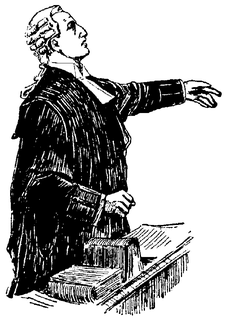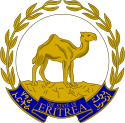
A barrister is a type of lawyer in common law jurisdictions. Barristers mostly specialise in courtroom advocacy and litigation. Their tasks include taking cases in superior courts and tribunals, drafting legal pleadings, researching the philosophy, hypothesis and history of law, and giving expert legal opinions. Often, barristers are also recognised as legal scholars.

Politics of Eritrea takes place in a framework of a single-party presidential republican totalitarian dictatorship, whereby the President is both head of state and head of government. The People's Front for Democracy and Justice is the only political party legally permitted to exist in Eritrea. The popularly elected National Assembly of 150 seats, formed in 1993 shortly after independence, elected the current president, Isaias Afewerki. There have been no general elections since its official independence in 1993. They are governed under the constitution of 1993. A new constitution was ratified in 1997, but has not been implemented.

Politics of Malawi takes place in a framework of a presidential representative democratic republic, whereby the President of Malawi is both head of state and head of government, and of a multi-party system. Executive power is exercised by the government. Legislative power is vested in both the government and the National Assembly. There is a cabinet of Malawi that is appointed by the President of Malawi. The judiciary is independent of the executive and the legislature. The government of Malawi has been a multi-party democracy since 1994. The Economist Intelligence Unit has rated Malawi as "hybrid regime" in 2016.

The Permanent Court of Arbitration (PCA) is an intergovernmental organization located at The Hague in the Netherlands. The PCA is not a court in the traditional sense but provides services of arbitral tribunal to resolve disputes that arise out of international agreements between member states, international organizations or private parties. The cases span a range of legal issues involving territorial and maritime boundaries, sovereignty, human rights, international investment, and international and regional trade. The PCA is constituted through two separate multilateral conventions with a combined membership of 121 states. The organization is not a United Nations agency, but the PCA is an official United Nations Observer.

Abortion in the United States refers to the practice of terminating a pregnancy, and it is among the most controversial and divisive issues in American society, culture and politics. Various anti-abortion laws have been in force in each state since at least 1900.

Abortion law permits, prohibits, restricts, or otherwise regulates the availability of abortion. Abortion has been a controversial subject in many societies through history on religious, moral, ethical, practical, and political grounds. It has been banned frequently and otherwise limited by law. However, abortions continue to be common in many areas, even where they are illegal. According to the World Health Organization (WHO), abortion rates are similar in countries where the procedure is legal and in countries where it is not, due to unavailability of modern contraceptives in areas where abortion is illegal.
A law firm is a business entity formed by one or more lawyers to engage in the practice of law. The primary service rendered by a law firm is to advise clients about their legal rights and responsibilities, and to represent clients in civil or criminal cases, business transactions, and other matters in which legal advice and other assistance are sought.
A legal guardian is a person who has the legal authority to care for the personal and property interests of another person, called a ward. Guardians are typically used in three situations: guardianship for an incapacitated senior, guardianship for a minor, and guardianship for developmentally disabled adults.

Education in Eritrea is officially compulsory between 7 and 16 years of age. Important goals of Eritrea's educational policy are to provide basic education in each of Eritrea's mother tongues as well as to produce a society that is equipped with the necessary skills to function with a culture of self-reliance in the modern economy. The education infrastructure is currently inadequate to meet these needs.

The High Court of Eritrea is the final court of appeal in Eritrea and the highest court in the Eritrean judicial hierarchy. It has both original and appellate jurisdiction.

The Regional Courts of Eritrea are an intermediate system of courts of appeal in Eritrea. It has both original and appellate jurisdiction.

The Community Courts of Eritrea are the foundation of the judicial system in Eritrea. The courts typically hear cases regarding minor infractions, typically involving sums of less than approximately $7,300.
Abortion in Argentina, when understood as induced, is considered a crime against a life and a person, and it can be punished with one to fifteen years of prison for anyone that induces an abortion. The same penalty is incurred by doctors, surgeons, midwives and pharmacists that induce or cooperate in the induction of an abortion, with the addition of a special disqualification for two times the length of their sentence. And any woman that intentionally causes her own abortion or consents to another person performing one on her, is faced with one to four years of prison.

The Office of Special Masters of the U.S. Court of Federal Claims, popularly known as "vaccine court", administers a no-fault system for litigating vaccine injury claims. These claims against vaccine manufacturers cannot normally be filed in state or federal civil courts, but instead must be heard in the U.S. Court of Federal Claims, sitting without a jury.
Dahlak (Dahlac) Marine National Park is a national park in the Northern Red Sea Region of Eritrea. It includes part of the Dahlak archipelago and the surrounding waters.
Timeline of women's legal rights represents formal changes and reforms regarding women's rights. That includes actual law reforms as well as other formal changes, such as reforms through new interpretations of laws by precedents.. For such things only in the United States, see Timeline of women's legal rights in the United States. The right to vote is exempted from the timeline: for that right, see Timeline of women's suffrage. The timeline excludes ideological changes and events within feminism and antifeminism: for that, see Timeline of feminism.

The current judiciary of Niger was established with the creation of the Fourth Republic in 1999. The constitution of December 1992 was revised by national referendum on 12 May 1996 and, again, by referendum, revised to the current version on 18 July 1999. It is an inquisitorial system based on the Napoleonic Code, established in Niger during French colonial rule and the 1960 constitution of Niger. The Court of Appeals reviews questions of fact and law, while the Supreme Court reviews application of the law and constitutional questions. The High Court of Justice (HCJ) deals with cases involving senior government officials. The justice system also includes civil criminal courts, customary courts, traditional mediation, and a military court. The military court provides the same rights as civil criminal courts; however, customary courts do not. The military court cannot try civilians.

Eritrea, officially the State of Eritrea, is a country in the Horn of Africa, with its capital at Asmara. It is bordered by Sudan in the west, Ethiopia in the south, and Djibouti in the southeast. The northeastern and eastern parts of Eritrea have an extensive coastline along the Red Sea. The nation has a total area of approximately 117,600 km2 (45,406 sq mi), and includes the Dahlak Archipelago and several of the Hanish Islands. Its toponym Eritrea is based on the Greek name for the Red Sea, which was first adopted for Italian Eritrea in 1890.

The Judiciary of Malawi is the branch of the Government of Malawi which interprets and applies the laws of Malawi to ensure equal justice under law and to provide a mechanism for dispute resolution. The legal system of Malawi is based on English law, modified since 1969. The Constitution defines the judiciary as a hierarchical system of courts, with the highest court being a Supreme Court of Appeal, together with a High Court and a number of magistrates' courts.

Corruption in Eritrea is a considered a deeply serious and growing problem. The level of corruption used to be considerably lower in Eritrea than in many other African countries. Indeed, it was traditionally viewed as having a “strong ‘anti-corruption’ culture” and considered relatively “egalitarian and corruption-free.” In 2006, a report by Bertelsmann Stiftung stated that corruption, as of that date, was not a serious problem within Eritrea. While noting that there had been “cases of corruption since independence,” they existed on a negligible level, although politically-motivated corruption allegations have been made. But, in fact, corruption is said to have been growing steadily worse ever since 1998, when, not long after the end of its decades-long war of independence, a border conflict with Ethiopia led to another war.










